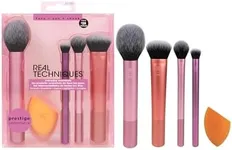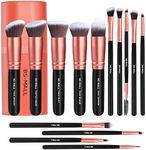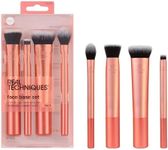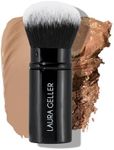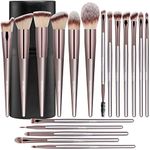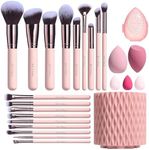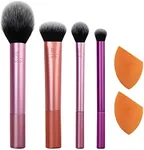Buying Guide for the Best Foundation Brush
Choosing the right foundation brush can make a big difference in how your makeup looks and feels. The right brush helps you apply foundation smoothly, evenly, and with the finish you want, whether that's natural, dewy, or full coverage. When picking a foundation brush, it's important to think about the type of foundation you use, the finish you prefer, and how much coverage you want. Understanding the key features of foundation brushes will help you find one that fits your needs and makes your makeup routine easier and more enjoyable.Brush ShapeBrush shape refers to the overall design of the brush head, such as flat, rounded, angled, or stippling. This is important because the shape affects how the foundation is applied and blended on your skin. Flat brushes are good for painting on liquid foundation and give a smooth, even finish, while rounded or domed brushes are better for buffing and blending, which can create a more natural look. Angled brushes help reach tricky areas like around the nose, and stippling brushes are great for building up coverage gradually. To pick the right shape, think about the finish you want and the areas you need to cover—if you like a flawless, airbrushed look, a rounded or stippling brush might be best, while a flat brush is good for quick, full coverage.
Bristle TypeBristle type means whether the brush uses synthetic or natural hairs. This matters because different bristles work better with different types of foundation. Synthetic bristles are usually best for liquid or cream foundations because they don’t absorb as much product and are easier to clean. Natural bristles are often used for powder foundations, as they pick up and distribute powder more evenly. If you mostly use liquid or cream foundation, go for synthetic bristles; if you use powder, natural bristles might be a better fit.
Bristle DensityBristle density is about how tightly packed the bristles are. Dense brushes hold more product and give fuller coverage, while less dense, fluffier brushes give a lighter, more natural finish. If you want a high-coverage look or need to cover blemishes, a dense brush is a good choice. If you prefer a sheer, natural look, a less dense brush will help you achieve that. Think about how much coverage you want and choose the density that matches your style.
Brush SizeBrush size refers to how big or small the brush head is. Larger brushes cover more area quickly, making them good for applying foundation to the whole face, while smaller brushes are better for precise application, like around the eyes or nose. If you want to save time and do your makeup quickly, a larger brush is helpful. If you like to be more detailed or need to reach small areas, a smaller brush is better.
Handle Length and ComfortHandle length and comfort are about how the brush feels in your hand and how easy it is to control. A longer handle can give you more control and is often preferred by people who like to work at a distance from the mirror, while a shorter handle is easier to maneuver up close. Comfort is important because you want a brush that feels good to hold and use. Try to pick a handle length that matches how you like to apply your makeup and feels comfortable in your hand.

